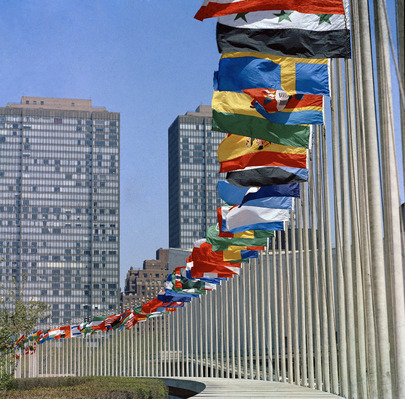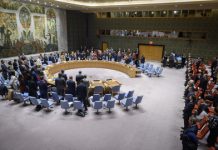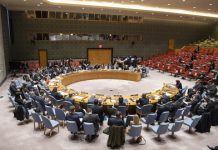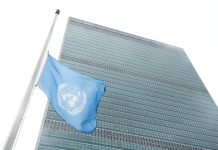UN News: Today we’re talking to Robert Opp, Chief Digital Officer of United Nations Development Programme, which has representation practically all around the globe. We meet today here in the hum and buzz of the preparation for the AI for Good Summit. Artificial intelligence is the talk of the town and of the whole world. Mr. Opp, would you tell us how does the UNDP see the use of AI and the technologies associated with that for the development globally? Are you already using any of that technology in projects in any areas? Do you see it as promising?
Robert Opp: Yeah, we see tremendous opportunity to use artificial intelligence technologies to impact all sorts of sectors, all sorts of angles of people’s work. And so on in terms of, for example, small businesses learning new skills, learning new languages, being able to translate seamlessly and interact with others around the world. There’s new business models, new opportunities. We see lots of lots of the kind of spaces to grow into. We are already using artificial intelligence, we use it. And there’s quite a few projects around the organization from, for example, a global approach that we use when we deliver electoral support to countries during their elections where we have a AI based platform that is that serves as a misinformation detection platform and then flagged suspicious content to human Fact Check. We’re also working in things like tuberculosis detection and screening, when it comes to countries like Kyrgyzstan and Tajikistan. So, there’s many different kinds of applications that UNDP is already deploying in the field, and we see a huge potential upside there as long as we control the risks that are associated with it.
UN News: What risks should the governments, and also all people who use the AI, take into consideration?
Robert Opp: In the deployment of any technology, we absolutely have to make sure that people and their rights are at the center of everything that we do. And that means really understanding how this might be a negative impact on people, making sure that we’ve got the right protections in places and. The country level this often means things like having the right data protection and privacy policies or legislation in place. Because AI is only as good as the data that it uses, and it uses a lot of personally identifiable data. In some cases you need to really make sure that you’ve got the right protections in place, the right safeguards that are there, and so there’s a wide range of things that we need to consider when we do that. And that’s why. We as UNDP, when we interact and work with our partner countries on the use of technology, we have a very holistic view that says we have this tremendous positive potential impact, but we need to ensure that we’ve got those safeguards that are there at the same time.
UN News: Is there any process going on, both on the UN level and within the global community with private partners and companies that you are interacting with about how to harness or set up the rules for the use of AI and digital technologies?
Robert Opp: Well, the AI for Good Summit that we’re at now is a very important part of the whole process of interacting between different stakeholders. This is a very multi stakeholder process, so. You have all. Sorts of people from private sector civil society, government sectors together. But we’re all working up toward the summit of the future this year, and we have a very important piece of the summit of the future, which is the global digital compact, where Member States are really discussing what are the kinds of directions that we need to head in. Our usage of technology, both positive the opportunity side as well as ensuring that we’re protecting against those risks. And so that global digital compact process is coming together right now Member States are negotiating right now. We hope to have a global digital compact that’s adopted in, in the summit of the future or during the summit of the future this year. And those will have a. Lot of important directions.
UN News: Of those AI directions, which do you think are the most promising, and which do you think will be used in order to promote quality globally and opportunities for all?
Robert Opp: AI has this tremendous opportunity, but it actually is not a very equal situation out there right now. If we see that there’s a few countries with the large technical capacity of the technology capacity and they’re rushing ahead and as they should with the development of technology and things. But we need to make sure that no one is left behind. That’s a key part of the UN system. That means we need to really make sure that countries have the capacities to use new technologies, they have access to some of the, for example, the data that they need to have and some of the kind of ability to use the technology that you know widely across populations, we have to bridge the digital divide, which means people need the right skill set. We have to ensure that public sector in these countries have the understanding of how to successfully leverage technology for it to be successful and all of those kinds of things. So that’s where the UN comes in. We want to make sure technology, including artificial intelligence is beneficial for all of humanity, that no one is left behind it.
UN News: At this AI for Good Summit for you personally and also for the general public, what is not to be missed, what is the focus of the discussion? What do you think is very important to highlight?
Robert Opp: Well, really interesting at the AI for a Good Summit is that there is a great mix of leading figures across different sectors. It’s not just all about the business sector, it’s not just all about government work and issues, it’s about bringing them all together. You have, for example, Sam Altman [CEO of OpenAI and founder of ChatGPT] will be speaking here, at the same time you have academics like Stuart Russell, a leading academic in the space of AI, and politicians that are around and really in charge of driving these policies in their countries, learning from what they’re seeing and learning from discussing with people. So, the real magic in this event is bringing people together and having the exposure to those sectors, which is not necessarily easy or common things for people to do.
UN News: It’s certainly bringing people together, but also bringing people and robots together. They’re going to be a part of that as well. Are you going to talk to one of them or maybe try to recruit for some UNDP job?
Robert Opp: We look forward to adopting the kinds of technologies that will support people. And if that’s robots, that will be what we’re interested in. But for us, it’s really about putting people first, looking at how we can support them. And we’ll embrace anything that we can to do that.
UN News: So, humanity should not be afraid of robots? We are still going to use them for our advantage, but not to replace ourselves?
Robert Opp: There is a future that we need to think about. Where we are as humanity right now. We need to think about our future and our interaction with technology over time. In the immediate term, I’m not concerned about “killer robots”. I think that what we really need to focus on is giving people the capacity to really embrace these technologies and use them to generate new jobs and use them to generate new business models, really understand how it can benefit all people in the society.
Source of original article: United Nations (news.un.org). Photo credit: UN. The content of this article does not necessarily reflect the views or opinion of Global Diaspora News (www.globaldiasporanews.com).
To submit your press release: (https://www.globaldiasporanews.com/pr).
To advertise on Global Diaspora News: (www.globaldiasporanews.com/ads).
Sign up to Global Diaspora News newsletter (https://www.globaldiasporanews.com/newsletter/) to start receiving updates and opportunities directly in your email inbox for free.


























